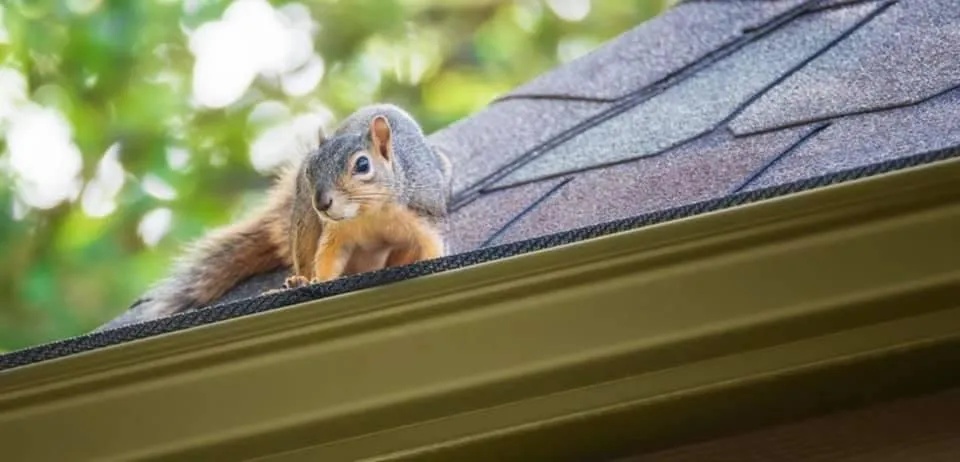Wildlife Control

Fully licensed and backed By International Association of Certified Home Inspectors (InterNACHI), the largest trade organization of residential and commercial inspectors

Wildlife Don't Need To Be In Your Home
Though they are important to keep our ecological balance, human-wildlife conflict always arise. Many times, these animals roam to our homes and can cause damage. These include disease transmission by rodents, property damage from squirrels, contamination from random animals, garden damage by groundhogs, and many more.,
Wildlife Is Important In Our Ecosystem, But They Don't Need To Be In Your Home

Though they are important to keep our ecological balance, human-wildlife conflict always arise. Many times, these animals roam to our homes and can cause damage. These include disease transmission by rodents, property damage from squirrels, contamination from random animals, garden damage by groundhogs, and many more.,

Bat Control
Create plans that can fortify your home against bats, which is a very common sign in Lakeland, FL.

Rodent Control
Have your home inspected for signs of infestations to remove these pests and seal any entry ways
In accordance with Florida Administrative Code rule 68A-4.001 General Prohibitions
and rule 68A-9.010 Taking Nuisance Wildlife, it is illegal to evict or exclude bats
during the maternity season (April 16 – August 14)
Proofing Your Home is More Important
Than Prevention
Effective wildlife control requires a balanced approach that considers ecological, ethical, and social factors. There needs to be combination of habitat modification, deterrents, and if necessary, lethal methods. There are cases that some companies just send workers to prevent, but not critter-proof your home.

Frequently Asked Questions
What types of wildlife are commonly removed from homes and businesses?
Common wildlife includes raccoons, squirrels, bats, birds, snakes, skunks, opossums, and rodents such as mice and rats.
How do I know if I have a wildlife problem?
Signs include unusual noises (scratching, squeaking), droppings, nests, damage to property, foul odors, and visible wildlife activity near or in the building.
Why is it important to remove wildlife from my property?
Wildlife can cause structural damage, spread diseases, contaminate food, and create unsanitary conditions. Removing them promptly helps prevent further issues.
What methods are used for wildlife removal?
Humane methods such as live trapping, exclusion techniques, and habitat modification are commonly used. In some cases, deterrents and repellents may also be employed.
Is wildlife removal safe?
Yes, professional wildlife removal services prioritize safety, using humane and non-lethal methods. Professionals are trained to handle wildlife safely to minimize risk to humans and animals.
Can wildlife removal prevent future infestations?
Yes, wildlife removal services often include exclusion measures such as sealing entry points, installing barriers, and advising on property maintenance to prevent future infestations.
What should I do if I find a wild animal in my home or business?
Avoid direct contact with the animal, secure the area if possible, and contact a professional wildlife removal service immediately.
Are there laws regarding wildlife removal?
Yes, there are local, state, and federal regulations that govern the removal of wildlife, particularly for protected species. Professional services ensure compliance with these laws.
How do professionals determine the best removal method?
The method depends on the species, the location of the animal, the extent of the infestation, and the specific circumstances of the property. A thorough inspection is typically conducted first.
What are the risks of DIY wildlife removal?
DIY removal can be dangerous, leading to injuries, ineffective removal, or even legal issues if protected species are involved. It’s best to rely on professionals for safe and effective solutions.
How long does the wildlife removal process take?
The time required varies depending on the species, the size of the infestation, and the complexity of the situation. Some issues can be resolved in a few hours, while others may take several days.
Is wildlife removal covered by insurance?
Some homeowner or business insurance policies may cover damage caused by wildlife or the cost of removal. It’s advisable to check with your insurance provider.
What should I do after wildlife is removed from my property?
After removal, it’s important to clean and sanitize the affected area, repair any damage, and implement exclusion measures to prevent future issues.
Can wildlife removal services also help with dead animals?
Yes, most wildlife removal services also offer dead animal removal, which includes locating and safely removing the carcass, followed by sanitization and deodorization.
How much does wildlife removal cost?
The cost varies based on factors such as the type of animal, the extent of the infestation, the difficulty of access, and the specific services required. A professional consultation can provide an accurate estimate.
What is the difference between residential and commercial wildlife removal?
Residential removal typically deals with smaller infestations in homes, while commercial services may involve larger-scale infestations in businesses, requiring more extensive measures and compliance with commercial regulations.
Are wildlife removal services available 24/7?
Many wildlife removal companies offer emergency services 24/7 to address urgent situations, especially when there's a risk to human safety or significant property damage.
What are some tips for preventing wildlife from entering my property?
Tips include securing trash bins, sealing entry points, trimming trees and shrubs, maintaining clean outdoor spaces, and installing barriers or deterrents around vulnerable areas.
Frequently Asked Questions
Bats
How do I know if I have bats in my home or business?
Signs of bats include squeaking or scratching noises, droppings (guano) near entry points or in attics, a strong ammonia-like odor, or seeing bats entering or exiting at dusk.
Why is it important to remove bats from my property?
Bats can carry diseases such as rabies and histoplasmosis, which is caused by fungal spores in bat guano. They can also cause structural damage and unpleasant odors in buildings.
Are bats protected by law?
Yes, many bat species are protected under state and federal laws, especially during their maternity season. Professional bat removal must comply with these regulations to avoid legal issues.
What is the safest method to remove bats from a building?
The safest and most humane method is exclusion, where one-way devices are installed to allow bats to exit but not re-enter. This method is best performed by professionals to ensure compliance with wildlife laws.
Can I use poisons or traps to remove bats?
No, using poisons or lethal traps is illegal and dangerous. It can also lead to dead bats in walls or attics, causing odor and sanitation issues. Exclusion is the recommended method.
What time of year is best for bat removal?
Bat removal is typically best done in late summer or early fall, after the young bats (pups) have matured enough to fly. Removing bats during the maternity season can trap pups inside, leading to their death and potential legal consequences.
How do professionals exclude bats from a property?
Professionals will identify all entry points, seal them, and install one-way exclusion devices. After confirming all bats have left, the entry points are permanently sealed.
What should I do if I find a bat inside my home or business?
If you find a bat indoors, avoid direct contact. Confine it to one room by closing doors, then open a window to allow it to exit, or contact a professional for safe removal.
How can I prevent bats from returning after removal?
After exclusion, all potential entry points should be sealed. This includes gaps around chimneys, vents, and rooflines. Installing bat houses away from the building can also provide bats with an alternative roosting spot.
What are the health risks associated with bats?
Bats can transmit rabies through bites or scratches, though this is rare. More commonly, their droppings (guano) can harbor fungal spores that cause histoplasmosis, a respiratory illness.
How much does professional bat removal cost?
Costs vary depending on the extent of the infestation, the size of the property, and the complexity of the exclusion process. An on-site inspection can provide a more accurate estimate.
What should I do about bat guano in my attic?
Bat guano should be professionally removed due to health risks. The area must be thoroughly cleaned and sanitized, and any insulation contaminated by guano may need to be replaced.
Are bats beneficial, and should I worry about removing them?
Bats are beneficial for ecosystems as they help control insect populations. However, they should be removed from buildings to avoid health risks and property damage. Bat houses can be installed to support them while keeping them out of your building.
What should I do if I’m bitten or scratched by a bat?
Seek medical attention immediately. Bat bites can transmit rabies, so it’s important to consult a healthcare provider for possible post-exposure prophylaxis (PEP) treatment.
What are common entry points for bats in buildings?
Common entry points include gaps in rooflines, soffits, eaves, vents, chimneys, and loose shingles or siding. Bats can squeeze through very small openings, so thorough inspection and sealing are crucial.
Can bats cause structural damage to my property?
Yes, while bats themselves don’t chew or scratch surfaces, their droppings can accumulate and cause staining, odor, and deterioration of building materials over time.

Is bat removal different for commercial properties?
Yes, commercial properties may require more extensive inspections and larger-scale exclusion efforts. Compliance with local health and safety regulations is also crucial in commercial settings.
Do I need a permit for bat removal?
Permits may be required for bat removal, especially if the species is protected. Professional wildlife control services can ensure compliance with all legal requirements.
Frequently Asked Questions
Rats
What are the signs of a rat infestation?
Common signs include droppings, gnaw marks, scratching noises in walls or ceilings, nests made from shredded materials, and sightings of rats themselves, especially at night.
Why is it important to remove rats from my property?
Rats can spread diseases, contaminate food, damage property through gnawing, and cause electrical fires by chewing on wires. Prompt removal helps prevent these risks.
What methods are used to remove rats?
Methods include trapping, baiting with rodenticides, and exclusion techniques to seal entry points. Professional services often use a combination of these methods for effective control.
Can I handle rat removal on my own?
While DIY methods are available, professional services are recommended for thorough removal, especially in large infestations or commercial settings where compliance with health regulations is critical.
How do professionals prevent rats from returning?
Professionals identify and seal entry points, eliminate food and water sources, and may offer ongoing monitoring services to prevent future infestations.
Are rat removal methods safe for pets and children?
Professional services use safe and targeted methods to minimize risk. They can offer pet-friendly traps or non-toxic solutions, and ensure that baits or traps are placed out of reach of children and pets.
What are the health risks associated with rats?
Rats can spread diseases like hantavirus, leptospirosis, and salmonella. Their droppings, urine, and dander can also trigger allergies and asthma in some people.
How long does it take to remove a rat infestation?
The duration depends on the severity of the infestation. Small infestations can often be resolved in a few days, while larger or more complex cases may take several weeks.
How much does professional rat removal cost?
Costs vary based on the size of the property, the extent of the infestation, and the methods used. A thorough inspection by a professional can provide an accurate estimate.

Can rats cause structural damage to my property?
Yes, rats can cause significant damage by gnawing on wood, insulation, wiring, and other building materials. They can also undermine structures by burrowing.
What should I do if I find rat droppings?
Avoid direct contact with droppings. Wear gloves and a mask, and carefully clean the area with disinfectant. It’s also important to identify and address the source of the infestation.
Can rats enter through small openings?
Yes, rats can squeeze through openings as small as 1/2 inch (about the size of a nickel). Sealing even small gaps in walls, foundations, and around utility lines is crucial for prevention.
What should I do if I see a rat during the day?
Seeing a rat during the day may indicate a large infestation, as rats are typically nocturnal. It’s advisable to contact a professional immediately for an inspection.
What are the differences between residential and commercial rat removal?
Commercial properties may require more extensive treatment and must comply with stricter health and safety regulations. Commercial services often involve ongoing monitoring and maintenance.
How can I prevent rats from entering my home or business?
Preventive measures include sealing entry points, keeping food in airtight containers, maintaining clean environments, eliminating standing water, and trimming vegetation near the building.
What attracts rats to my property?
Rats are attracted to easily accessible food, water, and shelter. Common attractants include unsecured garbage, pet food, bird feeders, and overgrown vegetation.
Can rats climb walls and enter through the roof?
Yes, rats are excellent climbers and can access homes and businesses through walls, roofs, and even drainpipes. Proper sealing of these areas is essential to prevent entry.
Is rat removal covered by insurance?
Some homeowner and business insurance policies may cover damage caused by rats but typically do not cover the removal process itself. It’s best to check with your insurance provider.
Are rats more common in certain seasons?
Rats are more likely to invade homes and businesses during colder months when they seek warmth and food indoors, but infestations can occur year-round.
What should I do if I suspect a rat infestation but haven’t seen any rats?
Even if you haven’t seen rats, signs like droppings, gnaw marks, and unusual noises should prompt an inspection by a professional to assess and address the situation before it worsens.

Fully licensed and backed By International Association of Certified Home Inspectors (InterNACHI), the largest trade organization of residential and commercial inspectors

@ Copyright 2026 - Elevate Home Solutions | All rights reserved
@ Copyright 2024 - Elevate Home Solutions | All rights reserved
Service Area
Lakeland, Plant City, Winter Haven, Auburndale, Mulberry, Orlando, Kissimmee, Champions Gate, Palm Beach, Tampa, Clearwater, St Pete, Sarasota, Melbourne, Daytona Beach, Palm Coast, Ocala, The Villages, Clermont, Davenport, Brooksville, Brandon, Merritt Island, Titusville, Sanford, Dunnellon, Crystal River, Palm Harbor, Dunedin, Largo, Pinellas Park, Ruskin, Riverview, Lutz, Wesley Chapel, Zephyrhills, Dade City, Bartow, Bowling Green, Wauchula, Haines City, Poinciana, Lake Wales, Frost Proof, Lake Buena Vista, Winter Garden, St Cloud, Winter Park, Lake Mary, Oviedo, Valrico, Altamonte Springs, Apoka, Leesburg, Wildwood, Bushnell, Belleview, Avon Park, Bradenton, Siesta Key
Contact Us
(863) 279-0190
HOURS OF OPERATION
Monday to Saturday
8:00 AM EST to 7:00 PM EST
